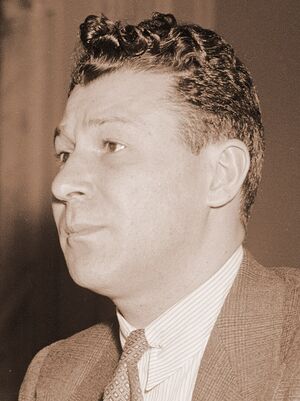Lee Pressman
(spook, lawyer) | |
|---|---|
 | |
| Born | Leon Pressman July 1, 1906 Lower East Side, New York City, USA |
| Died | November 20, 1969 (Age 63) Mt. Vernon, New York |
| Nationality | American |
| Ethnicity | Jewish |
| Alma mater | Cornell University, Harvard Law School |
| Parents | • Harry Pressman • Clara Pressman |
| Children | • Anne Pressman • Susan Pressman • Marcia Pressman |
| Spouse | Sophia Platnich |
| Party | Communist Party of the United States of America |
US labor attorney and earlier a US government functionary, alleged to have been a spy for Soviet intelligence during the mid-1930s. | |
Lee Pressman was a labor attorney and earlier a US government functionary, publicly alleged in 1948 to have been a spy for Soviet intelligence during the mid-1930s (as a member of the Ware Group), following his recent departure from Congress of Industrial Organizations (CIO) as a result of its purge of Communist Party members and "fellow travelers". From 1936 to 1948, he represented the CIO and member unions in landmark collective bargaining deals with major corporations including General Motors and U.S. Steel.
Background
Pressman was born Leon Pressman on July 1, 1906, on the Lower East Side of in New York City. In his teens, the family moved out to the Bensonhurst section of Brooklyn. In 1922, he entered Washington Square College of New York University, where classmates included Nathan Witt and possibly Charles Kramer (later, fellow AAA and Ware Group members), then transferred to Cornell University, where he studied under labor economist Sumner Slichter. In 1926, Pressman received his bachelor's degree from Cornell University in Ithaca, New York. In 1929, he received a law degree from Harvard Law School.[1]
Career
He left his law practice to accept a position in Roosevelt's New Deal administration. In 1934, while assistant general counsel in the Agricultural Adjustment Administration, Pressman gravitated within the Communist Party orbit. Although he severed formal affiliation with the party after leaving government service a year later, he did not break ideologically with Stalinism until 1950. In 1937 Pressman became counsel for the Steel Workers Organizing Committee, and soon thereafter general counsel for the CIO. Brilliant and quick-witted, Pressman won the confidence of John L. Lewis, and later, CIO president, Philip Murray. He came to be considered "indispensable" in CIO administrative matters. While holding his position in the CIO, Pressman continued to consult with Communist Party leaders. However, he was actually forced to act more as a check on, rather than agent of, the Stalinist interests in the CIO. Pressman resigned from the CIO in 1948 to back the Progressive Party standard-bearer Henry Wallace's unsuccessful attempt for the presidency. He retired to the practice of law during the Korean War.[2]
Espionage allegations
On August 3, 1948, in testimony under subpoena before the House Committee on Un-American Activities (HUAC), Whittaker Chambers identified Pressman as a member of the Ware group.[3]
On August 4, Pressman characterized Chambers' testimony as "smearing me with the stale and lurid mouthings of a Republican exhibitionist who was bought by Henry Luce." By using Chambers, he claimed, HUAC sought to achieve three objectives: distract Americans from "the real issues" (civil rights, inflation, housing, Israel, and repeal of the Taft-Hartley Act), smear FDR's New Deal officials, and discredit Henry Wallace and his associates."<ref"Pressman Sees Inquiry a 'Shameful Circus'". Washington Post. 5 August 1948. p. 3.</ref>
On August 20, 1948, in testimony under subpoena before the HUAC, Pressman declined to answer questions regarding Communist Party membership, citing grounds of potential self-incrimination.[4]
The release of KGB documents shows that Pressman was never a Soviet spy but was very much part of the support network for people like Alger Hiss, Laurence Duggan, Harry Dexter White, Abraham George Silverman and Julian Wadleigh, who did steal documents. "He (Lee Pressman) had never been the classic 'spy' who stole documents. Neither his work in domestically oriented New Deal agencies in the early 1930s nor his later role as a labor lawyer gave him access to information of Soviet interest. Instead, he functioned as part of the KGB espionage support network, assisting and facilitating its officers and agents. He gambled that there would not be anyone to contradict his evasions and that government investigators would not be able to charge him with perjury. He won his bet."[5]
References
- ↑ https://www.nytimes.com/1948/10/18/archives/race-for-congress-lively-in-brooklyn-multer-and-pressman-followers.html
- ↑ https://www.jewishvirtuallibrary.org/pressman-lee
- ↑ https://web.archive.org/web/20100721004854/http://www.law.umkc.edu/faculty/projects/ftrials/hiss/8-3testimony.html
- ↑ https://web.archive.org/web/20090114112554/http://www.time.com/time/magazine/article/0,9171,856648,00.html
- ↑ John Earl Haynes, Harvey Klehr, and Alexander Vassiliev, Spies: The Rise and Fall of the KGB in America (2009) page 428., quoted in Spartacus Educational https://spartacus-educational.com/Lee_Pressman.htm